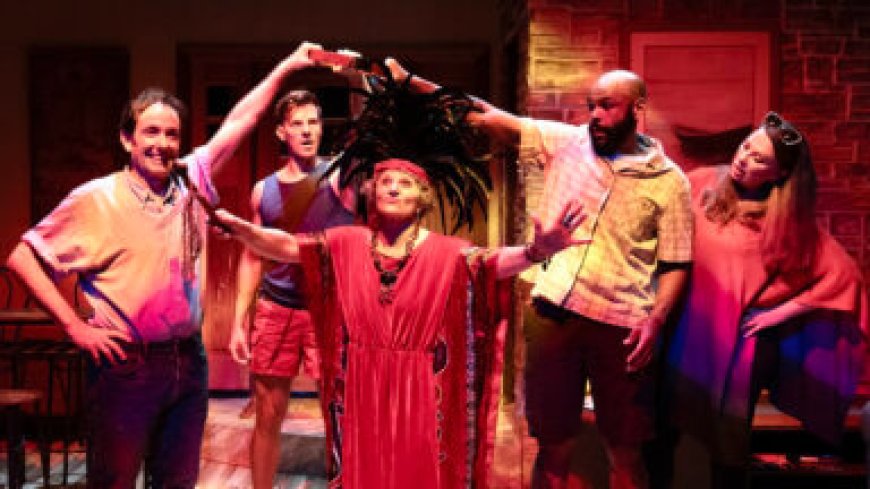Running ragged: ‘Chasing Happy’ limps to the finish line
“Chasing Happy,” the new, foot-dragging comedy now on Theatre Row, is the kind of play that can only be described as a “hot mess.” To wring any kind of entertainment — or even a few laughs — from it, an audience is advised not to look too closely at the overstuffed plot, incoherent structure, reliance … Read More

“Chasing Happy,” the new, foot-dragging comedy now on Theatre Row, is the kind of play that can only be described as a “hot mess.” To wring any kind of entertainment — or even a few laughs — from it, an audience is advised not to look too closely at the overstuffed plot, incoherent structure, reliance on stereotypical characters, or hackneyed tropes. Sadly, it’s the job of a critic to do just that, and in nearly every respect, Michel Wallertein’s play comes up lacking.
In a program note, Wallerstein says the play is a “love letter to Provincetown,” yet aside from a beach house set (Christian Fleming’s design is a high point of the evening.) and a few references to local places, this could be anywhere.
The overstuffed plot concerns Nick, a 54-year-old architect who has become famous for publishing his murdered lover’s memoir about, you guessed it, chasing that elusive happiness. At the outset, he’s had a fling with a 27-year-old twink, Brad, a bartender who wants to be a painter and has a daddy fixation. As the two of them are engaging in post-coital triviality, Helen, Nick’s ex-wife, arrives. She and Nick are best friends, though divorced, and Helen who is about to have a total colectomy (removal of a diseased colon resulting in the need for a colostomy bag), injects herself into the scene. She is followed by the violent intrusion of Rob, a local contractor, about 50, and Brad’s current boyfriend who confronts Nick and threatens him. Rob is followed by the arrival of Nick’s mother, Maria, from an assisted-living facility in Florida for her week in Ptown, and who, by the way, doesn’t like Helen.
Nick and Rob end up in a fight for Brad’s affections. Helen has her surgery. Maria takes Brad to Florida to try to promote his art career, forcing Rob and Nick to agree to have no contact with Brad for a month. Thrown together on a project, Nick and Rob discover their deeply hidden secrets, and… Well, if you’ve ever endured a vapid rom-com, you can guess what happens.
All of this could potentially work for comedy if it were more focused. Given how much exposition is required, the play never acquires the crispness or momentum a comedy of this nature requires. (Alxa Kelly’s turgid direction does the script no favors.) Why do we need to know about Maria’s best friend Rosie from Florida? For that matter, why does Maria dress in faux Inca robes to get Rob, Nick, and Brad to promise not to talk to one another? And where did those come from, since Maria arrives without luggage?
Moreover, what possesses someone to think that radical intestinal surgery is the stuff of comedy? Why is Helen up and about pondering a date with a young intern just days after her surgery? (Note to costume designer Elena Vannoni: Though a colostomy bag tends to ruin the drape of a dress, why did you avoid it?) For those of us who know someone who has gone through this highly specialized and risky surgery, it’s doubtful that it could be done on the Cape, where hospitals are scarce, for one, and the inevitable physical and emotional issues it raises for those who survive the procedure is no laughing matter.
The real miss in this piece, though, is that the recurrent themes — aging in the gay world, viability as time passes you by, coping with loss, trying to find one’s way in a difficult world — aren’t developed in any meaningful way. Noel Coward, for one, consistently demonstrated that human comedy could be derived from the most difficult life situations. In this case, what could be human and mordantly funny, is shallow and clogged with unnecessary exposition. That’s hard to play.
The cast, however, does the best they can with what they’ve been given. As noted above, Kelly’s direction never explores whatever depth of character might be hiding in the script, and her idea of comedy appears to be manic staging and shouting. It grows tedious in short order, and the sex scenes are amateurish. Spencer Aste as Nick, Schyler Conaway as Brad, Jenny Bennett as Helen, Christopher James Murray as Rob, and Atoinette LaVecchia as Maria, all seem to be reasonably competent actors, but they are hidebound by the material. For instance, having Aste as Nick read from the book “Chasing Happy” reveals the book is an exercise in banality, and then having the audience repeat hackneyed affirmations, as if we were at the reading, is cringe-inducing. Seriously, La Vecchia should sue whoever put her in the ghastly fright wig and forced her to play a version of Sophia from “The Golden Girls.”
Judging by the number of people who headed for the exit at intermission at the performance I saw, I’m reasonably certain that I’m not alone in feeling this whole exercise is nothing more than a wild goose chase.
“Chasing Happy” | Theatre Row | 410 West 42nd Street | Weds-Sat 7:30 p.m.; Weds, Sat, Sun 3 p.m. | Tickets from $37.50 | bfany.org | 2 hours, 10 mins, 1 intermission |

 Mark
Mark 





